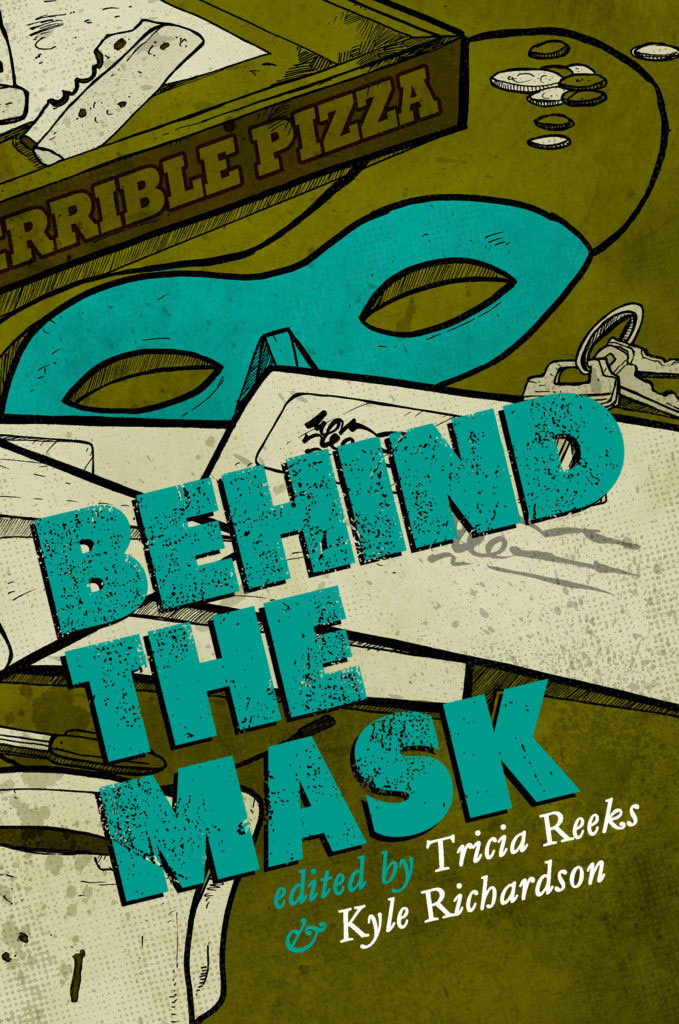Behind the Mask
Two years ago, Meerkat Press founder Tricia Reeks listened as co-editor Kyle Richardson talked enthusiastically about comic book superheroes. That led to issuing a call for submissions. Seven hundred stories poured in, 20 of which are published in the delightfully entertaining book, Behind the Mask.
Two years ago, Meerkat Press founder Tricia Reeks listened as co-editor Kyle Richardson talked enthusiastically about comic book superheroes. That led to issuing a call for submissions. Seven hundred stories poured in, 20 of which are published in the delightfully entertaining book, Behind the Mask.
Since I’m a neophyte when it comes to what goes on in the superhero realm, I was pleased to discover that the significant element in such stories is the relative normality of the inhabitants, at least until something crops up that’s anything but normal.
Take Alice, the star of “Pedestal,” by Seanan McGuire. Alice copes with her chatty mirror image and—with good reason—avoids other shiny surfaces. She has not felt like leaving home and has been having groceries delivered, but, “One too many shipments of rock-hard pears and tasteless tomatoes” drive her to Safeway where “the air was cool and sweet and smelled faintly of the disinfectant that they used every time someone spilled a gallon of milk or dropped a jar of pickles. Best of all, nothing was reflective.”
Now what’s more normal than young people dating? Well, if you’re superhuman, you might have a conversation like Jennifer Pullen creates in “Meeting Someone in the 22nd Century or Until the Gears Quit Turning.” Greg, a comic book artist has just asked Sandra on a date:
“If we’re going to go out, you should know I’m a cyborg,” she says.
“Cyborgs are cool,” he says.
Over dinner of meatloaf sushi and Cherry Coke, Greg gives her arm a light pinch:
“You feel real to me, and I bet you’d bleed if you bit your tongue,” he says.
“I’m a cyborg, not an android, silly. A cyborg is just a person who is partially machine.”
[ . . . ] “What part?” he asks.
“My heart,” she says.
Other great dialogue comes from Matt Mikalatos’ story “The Beard of Truth.” After Jimmy figures out what his superpower is, he phones his girlfriend:
“That’s amazing, Jimmy! What did you get?”
“Some sort of truth serum thing. Try to tell me a lie.”
She paused, then said, “I’m leaving you.”
“[ . . . ] Um. Please tell me my truth serum isn’t working.”
Some tales contain words of wisdom. “Ms. Liberty Gets a Haircut” by Cat Rambo presents an all-woman super group caught up in gender identification. Things turn out mostly fine, and in the end, Ms. Liberty states: “Every woman knows she’s a woman, [ . . . ] And every hero is a hero. [ . . . ] That’s who they are.”
Whereas, in Kate Marshall’s “Destroy the City with Me Tonight,” Cass has this lesson for her superhero peers: “She’s always wondered why you’d bother with a mask; now she gets it. It’s not to be concealed, it’s to be seen, to be remembered.”
In other stories, I came across diverse superpowers. “Inheritance,” written by Michael Milne, features young Oliver whose extraordinary strength has unexpected, fiery consequences when the girl he likes asks if he wants to go to the movies. His shenanigans force his family to move several times. Meanwhile, the power he really wants is to be able to fly.
“Madjack” is Nathan Crowder’s piece about Atlas, a rock singer in her dad’s band. Unfortunately, Dad, who’s known as Madjack and who happens to be an alien, is murdered. When Atlas visits her mom in Jaipur, she’s told, “Your father, ever the showman, [ . . . ] is to be cremated when he arrives here, and then packed into fireworks.” That aside, Dad had been ordered by “an unnamed planet” to “conquer and enslave” the world.
Earth is also in danger from the Shakespeare-quoting Dr. Entropy, in “Fool,” by Keith Frady. Entropy has a bit of a god complex, echoed in his words, “This planet may be diseased, but I am its cure, its favored son.” As you can see, not all costumed characters are heroes. Not at first, anyway.
Theatricality is apparent throughout many of the stories, and why not? Anytime you put on a costume, it’s a game of “let’s pretend.” And if you’re of the mind that robots and androids and cyborgs will eventually take over, or even if you don’t believe that, you’ll find satisfaction in reading these exceptional and enjoyable stories. As for me, I’d certainly welcome a few of the superheroes in Behind the Mask to step in, or fly in, and help solve some of the problems of this world.





